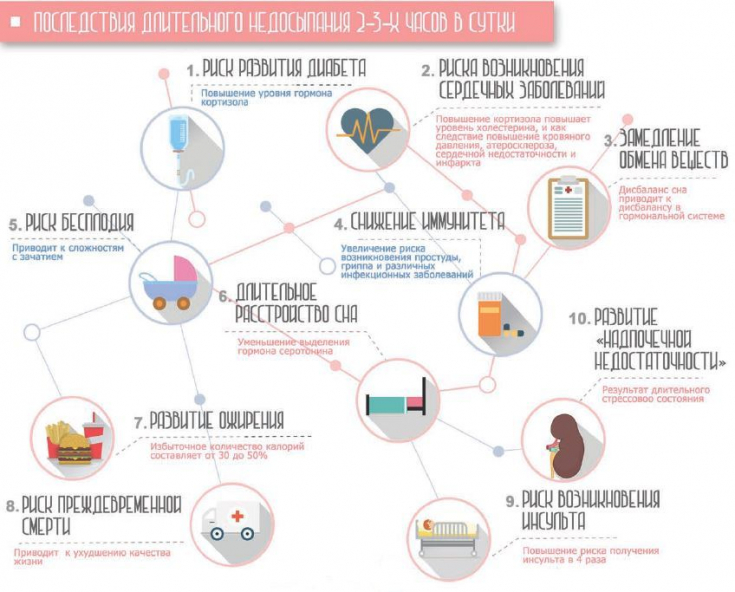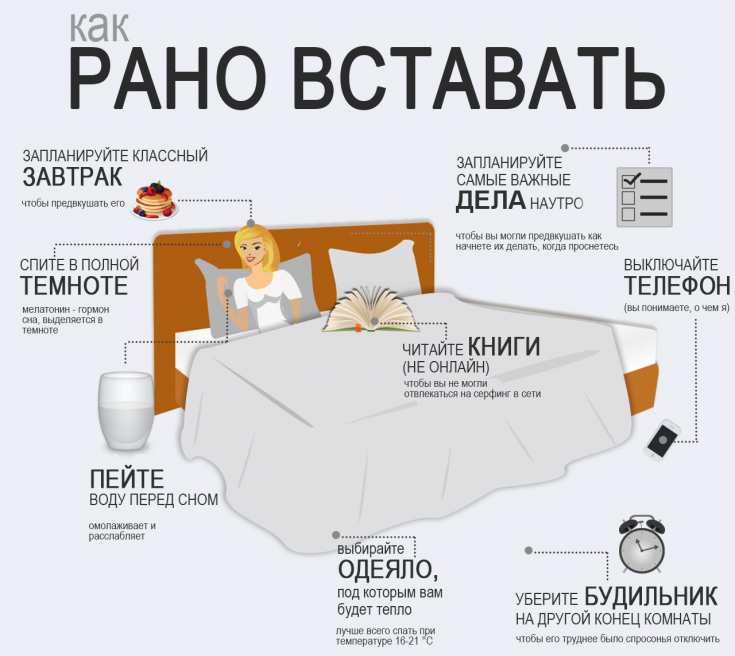We spend almost a third of our life in sleep, but until recently know almost nothing about it. The development of technology has allowed at least a little, but to lift the veil of secrecy. A study of the functioning of the brain of a sleeping person provides answers to many questions.
What processes happen during sleep? How are sleep and the nervous system related? Why is full, sound, uninterrupted sleep so important for health? In this article we will understand why it is important to sleep properly and how to accustom yourself to good rest.
- How the nervous system and sleep are related
- The dangers of lack of sleep: the consequences of lack of sleep
- Top 5 rules for healthy sleep
How are the nervous system and sleep connected
Scientists have been looking for an answer to the question: why do you need to sleep. After all, from the point of view of evolution, this is the most pointless exercise — take and disconnect for several hours, remaining completely defenseless. However, since humanity has not died out and, moreover, has not gotten rid of this "habit", then sleep is vital. And it really is.
When falling asleep, we like turn off both our consciousness and physical activity. However, research has shown that the brain does not switch off, but cycles change occur in its activity. These cycles, replacing each other, are called the phases of REM and non-REM sleep. During the night they replace each other 5 6 times. Scientists have found that all animals, except cold-blooded animals, have these phases. According to one version, REM sleep is necessary for the maturation of nervous tissue and the formation of brain architecture. This proves that sleep and the nervous system, and more precisely its development, are closely interrelated.
More useful information on our Instagram page!
The fact that children have much longer REM sleep cycles than adults only confirms — it is the fast phase that is needed for the maturation of nerve cells. And in the period of intrauterine development, the fetus spends most of its time in REM sleep. Therefore, it can be argued that the formation of brain regions is impossible without this cycle.

And what about adults whose brains are already formed? Why do they need REM sleep? It turns out that during this period the brain "filters" the information received during the day, forms memories, and, on the contrary, erases some events from the memory. It is this sorting of data, according to scientists, that generates dreams. Chaotic bursts of neural impulses are transformed into vivid visions that are not connected by any plot, cannot predict the future, and, in general, are thought out and structured by us at the moment of awakening.
Read also: The nature of nightmares: why you have bad dreams
A series of experiments on animals has proven thatit is the phase of REM sleep that is vital. If you constantly wake up the animal exactly at the moment of the onset of this phase, then after about 2-3 weeks it will die. That is, it is important not to just sleep, but to go through the fast phase. A what if not? How will the absence or lack of full-fledged,
However, sleep is needed not only for memory and mind. It was also experimentally proven that sleepy study participants reacted to events more emotionally and aggressively. The brain did not give out the correct algorithm of actions, but gave commands like "hit and" and "run" (an ancient pattern of behavior peculiar to higher primates).
Depriving ourselves of healthy sleep, we lose our human appearance and are unable to make informed and reasonable decisions.

large amount of melatonin
.Why you want to sleep during the day and how to deal with itThis hormone is involved in many processes, but its main properties — regulate the circadian rhythm and inhibit the growth of tumors. The connection between the growth of some cancers and insomnia has been repeatedly proven. Therefore, it is important not only to sleep in principle, but also to sleep correctly. How exactly
read on.So, you need to get enough sleep to be healthy, smart, reasonable and cheerful. So we completely "purify" the brain from unnecessary information, form memories, protect your body from diseases. Make sure you sleep well by checking our Healthy Sleep Checklist.1. Go to sleep before 00:00 and wake up after 05:00
It is during this period that the maximum amount of melatonin is produced. This hormone is very sensitive to daylight, so it ceases to be produced at dawn. All sleep after 5–6 morning can be conditionally considered useless.

2. Make sure there is no light
Again, given the sensitivity of melatonin to light, you should try to remove all light sources. Even a blinking light on a monitor can reduce the production of this hormone. If complete darkness is not possible, wear a sleep bandage. And, yes, do not teach children to sleep with a night light on, this is not at all for the benefit of a growing body.
3. Ventilate and cool the room
For sound sleep the best conditions — thermoneutrality (when the body temperature is approximately equal to the ambient temperature). For a person who sleeps in pajamas under a light blanket, such conditions are possible at a temperature in 16 19 degrees.
Follow us on InstagramElectrical devices emit electromagnetic fields. Our brain is the same, only these frequencies do not match. This imbalance interferes with the normal transitions from one phase of sleep to another, and in principle, it has a bad effect on the work of all vital systems of the body. Obviously, it is impossible to de-energize all the equipment in the house, but although not putting a smartphone near the pillow is easy.

5. Last carbohydrate intake at least 4 hours before sleep
Drinking a cup of tea with biscuits before bedtime can significantly impair the quality of that very sleep. A sudden rise and then fall in insulin levels in the blood can lead to an inability to sleep or a sudden awakening in the middle of the night.
The technical revolution has taken man far away from the natural rhythms of life. We don't fall asleep when the sun has set, and we stand get with roosters». But evolution did not for centuries perfected the daily rhythms of sleep and wakefulness, so that they could be ignored without consequences.
Read also:Whether to take melatonin for sleep: 5 reasons to think
More useful information on our
YouTube channel






Add a comment